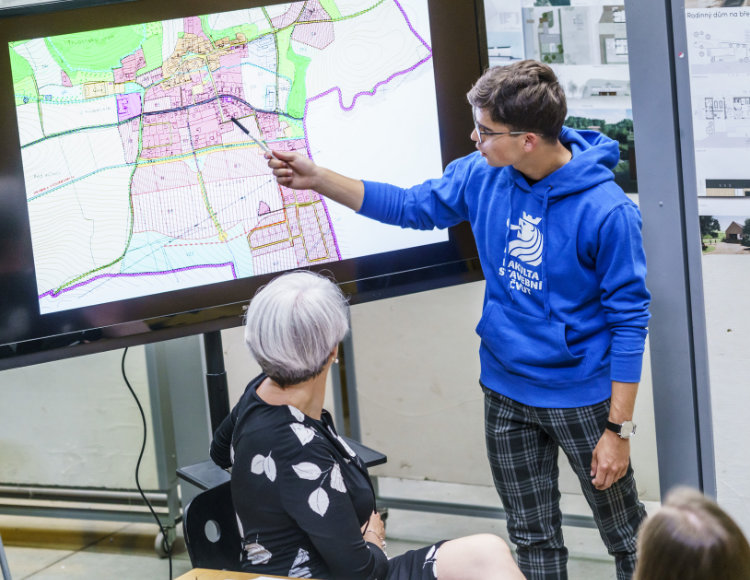Studies at university significantly differ from those at secondary school. University students are already adults, Faculty teachers’ colleagues. Their study and the fulfilment of their study duties is within their own responsibility, and the teachers are the people who lend them a helping hand, open their eyes and show them the way. Students, however, must walk the path on their own.
First-year students quickly get used to a different system of teaching and to a different way of the evaluation of acquired knowledge.
The basic information related to the Faculty of Civil Engineering CTU in Prague which should help the freshmen find their way is below.
Students are admitted to study in study programmes, which define the field of study. Each study programme has its specific study plan, i.e. a list of courses that must be passed by the student to be able to successfully complete their studies and be awarded a university degree. Each course is evaluated by credit points, which are a sort of virtual “points” granted to the student for its completion, and a grade, which shows how well the student has mastered the respective subject matter. To advance to the next phase of studies (semester, year) a minimum number of credit points is prescribed. Each programme has a fixed standard study plan, which assigns individual courses in an optimum way but students can adjust this schedule of courses and modify their study plan using the credit point system. The studies comprise compulsory courses, which must be passed by the student, compulsory elective courses, from which the student chooses a prescribed number according to their study orientation, and elective courses, which can be added just out of interest, in principle, “on top” of the others.
Instead of half years there are two semesters and an examination session
Studies at university usually do not start until the second half of September. The academic year is divided into two semesters – winter and spring, which always consist of 13 weeks of instruction in registered courses, and 6 weeks of the examination session, in which the knowledge acquired by the students is verified.
Instruction is more than just lectures
The core of instruction at the Faculty of Civil Engineering CTU in Prague are traditional lectures, which make the students familiar with the theoretical fundamentals of the subject matter, and practical classes, in which the acquired knowledge is verified in practice. Studies also comprise laboratories, measurements and other practical fieldwork. An important component part of education are projects and studios in the study programme of Architecture and Building Sciences, in which the students design and consult their works under the leadership of experts.
22. 9. 2025 – 19. 12. 2025
instruction in the winter semester
22. 12. 2025 – 4. 1. 2026
winter holidays
5. 1. 2026 – 13. 2. 2026
examination session
16. 2. 2026 – 15. 5. 2026
instruction in the spring semester
18. 5. 2026 – 26. 6. 2026
examination session
29. 6. 2026 – 31. 8. 2026
summer holidays, practice, training courses

Individual courses are completed by a credit, an examination, a combination of a credit and an examination or a classified credit. Successful completion of a course represents the fulfilment of the requirements specified by the teacher for obtaining the respective type of completion. A credit is without any classification, one needs, e.g., to calculate problems or make measurements, write a thesis, pass a test. A classified credit is mostly awarded for a completed creative work (project, drawings, etc.), where the assignment is both fulfilled and evaluated by a grade depending on its quality. An examination verifies the scope of acquired theoretical knowledge, which is evaluated by a grade. In some courses, allowing students to take an examination is conditioned on granting a credit as a proof of the acquisition of the basic knowledge in the respective course.

Examinations are graded by letters where A is the highest evaluation level and corresponds to 1-excellent, while F means that the student has failed. At the Faculty of Civil Engineering CTU in Prague, in the standard regime, there are two attempts to take an examination at the first course registration, and two attempts at the second course registration. To get a third attempt to take an examination, the student may use the so-called “joker”, if it is available to them.
A “joker” represents a chance of using one “extra” retaking attempt for selected courses. Jokers are assigned to each student at their enrolment in study and their number equals twice the length of the standard time of study in the accredited study programme. If, for example, the standard time of study in a selected Bachelor’s study programme is 4 years, the student will be assigned 8 jokers which they may use during their Bachelor’s study.

Everyone may “get stuck” on some course from time to time. Some subject matter is more easily managed by grammar school students, while some other suits students from secondary technical schools better. The instruction system at the Faculty has been set up so that students coming from both types of school can catch up with each other in their knowledge during the first year of study. Besides, the Faculty is ready to help with studies – students can use consultations with teachers, both in their office hours and by individual agreement. Complementary courses can also be registered in which selected subject matter is repeated at a slower pace. In addition, mutual cooperation among students has been successfully running at the Faculty for many years.
In the case of other specific needs, Counselling Services in career, educational and psychological issues are available to students.
Responsible: prof. Ing. arch. Ing. Zuzana Pešková, Ph.D.
To provide the best experiences, we and our partners use technologies like cookies to store and/or access device information. Consenting to these technologies will allow us and our partners to process personal data such as browsing behavior or unique IDs on this site and show (non-) personalized ads. Not consenting or withdrawing consent, may adversely affect certain features and functions.
Click below to consent to the above or make granular choices. Your choices will be applied to this site only. You can change your settings at any time, including withdrawing your consent, by using the toggles on the Cookie Policy, or by clicking on the manage consent button at the bottom of the screen.